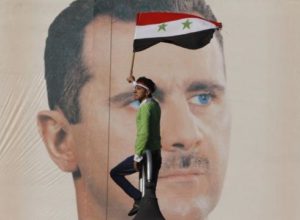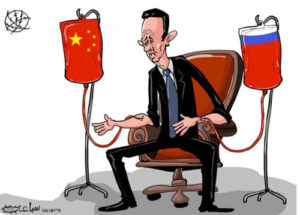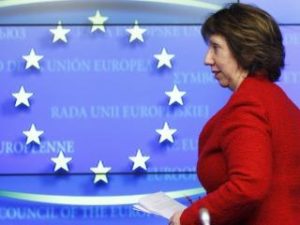 “How can the world do nothing?” The massacre of the Syrian people has taken place for too long now with no end in sight. In addition to the atrocious violence perpetuated by the Al-Assad regime, American and French journalists, Marie Colvin and Remi Ochlik, lost their lives several days ago leading to international public outcries. The political game taking place backstage is one of the utmost fascinating in recent times with a large number of actors: the European Union, the U.S., EU Member States, the Arab League, the UN, Russia and China. Syria is a true dilemma for two reasons: on one side, how can we do nothing?; on the other, military intervention could be extremely costly and destabilizing, even more so than this volatile region.
“How can the world do nothing?” The massacre of the Syrian people has taken place for too long now with no end in sight. In addition to the atrocious violence perpetuated by the Al-Assad regime, American and French journalists, Marie Colvin and Remi Ochlik, lost their lives several days ago leading to international public outcries. The political game taking place backstage is one of the utmost fascinating in recent times with a large number of actors: the European Union, the U.S., EU Member States, the Arab League, the UN, Russia and China. Syria is a true dilemma for two reasons: on one side, how can we do nothing?; on the other, military intervention could be extremely costly and destabilizing, even more so than this volatile region.
Thanks to their veto power, China and Russia have been blocking any projects for a UN Security Council resolution condemning the current violence orchestrated by the Syrian government against its people. Their rationale is that they do not want the UN to be involved in further cases of regime change. They fear that the Libyan campaign has set up a precedent for intervention based on human rights. The enforcement of the concept of the Responsibility to Protect in Libya did raise red flags in Beijing and Moscow. However, the perpetual blockades of ethical humanitarian interventions raise a central question: can the international community continue to be taken hostage by two powers with inward looking foreign policies and repressive domestic political systems?
Interestingly enough, the Chino-Russian blame game is also an opportunity for the leaders of the Euro-Atlantic community. In France for example, Hollande and Sarkozy, both in the middle of their presidential runs, have extensively emphasized the Chinese and Russian problem in trying to come up with a UN Security Council Resolution. However, one question has not been asked: too what extent have China and  Russia been used as scapegoats by Europeans in order to delay any kind of military or humanitarian intervention in Syria?
Russia been used as scapegoats by Europeans in order to delay any kind of military or humanitarian intervention in Syria?
The answer to this question is dual: first, the Euro-Atlantic community is simply on hold during this period of elections. Obama and Sarkozy are probably not too keen in launching a new military operation prior to the sanctioning power of the voters coming up in May and November. They do not want to be sanctioned for such actions considering the uncertainty of the outcomes. Furthermore, on both side of the Atlantic the political debate has ignored the big questions on foreign policy. We are paying the price for this aberration and the egocentrism of our elected political class and voters solely focusing on the debt crisis. Second, it would be a mistake to compare an intervention in Syria with Libya. Syria and Libya are two very distinct cases. The situation is much more complex with considerable geopolitical, religious, ethnic, political and economic issues. Considering the regional complexities to intervene, the members of the Euro-Atlantic community are hesitant to launch a military operation.
Until today, what has been the role of the EU? What has been the message emanating from the EEAS? Since the diplomatic and military fiasco of Libya, the EEAS needs to position itself as a central actor for cooperation and coordination among the 27. Libya has been a disaster for the CSDP as it was the perfect scenario for the deployment of a EU mission. Libya was exactly the sort of mission that the CSDP was designed for. During the Libyan campaign, the CSDP was nowhere. Even after the agreement on the creation of the EUFOR Libya, which has never been launched, there was a sense that the EEAS will take a look at the shortfalls and try to adjust it. It appears that it has not been the case.
From a diplomatic standpoint, in a video posted on the Commission’s website, HR Ashton declared on February 7th, 2012 that she has been in touched with the Secretary General of the Arab League and emphasized the need to empower it. As for the humanitarian situation on the ground, HR Ashton claimed that the EEAS has EUR 3 million ready for the Red Cross and will continue to work with them. Of course, Ashton emphasizes the importance of being involved with the UN Secretary General and other UN members. When it comes to the question of sanctions, she claimed that the Foreign Affairs Council is in charge. Even though some individual EU Member States have recalled their ambassadors, the agreement among the 27 is to stay and remain as long as possible in Syria. On February 22nd, following the killing of the two journalists, HR Ashton “condemns in the strongest terms these crimes.” So far, the EEAS’ strategy has been to reach out to other international institutions and monitor the situation on the ground. The diplomatic game is on, but how far and relevant will it be?
with the Secretary General of the Arab League and emphasized the need to empower it. As for the humanitarian situation on the ground, HR Ashton claimed that the EEAS has EUR 3 million ready for the Red Cross and will continue to work with them. Of course, Ashton emphasizes the importance of being involved with the UN Secretary General and other UN members. When it comes to the question of sanctions, she claimed that the Foreign Affairs Council is in charge. Even though some individual EU Member States have recalled their ambassadors, the agreement among the 27 is to stay and remain as long as possible in Syria. On February 22nd, following the killing of the two journalists, HR Ashton “condemns in the strongest terms these crimes.” So far, the EEAS’ strategy has been to reach out to other international institutions and monitor the situation on the ground. The diplomatic game is on, but how far and relevant will it be?
On the issue of sanctions, a recent article published in EUObserver argued that the “EU ban is not as categorical as it sounds” for the simple reason that each EU Member State follows up on the EU sanctions in different ways. The journalist claimed that “there is no transparency even among EU institutions and Member States. EU countries do not tell the European Commission or the External Action Service what they have frozen.” Then each Member State has its own rules and level of compliance. Austria, Britain, and Cyprus are the most lenient of the group. One example underlined in the article was a Russian ship being able to refuel in Cyprus en route to unload weapons in Syria.
One option would be to apply the Kosovo model to Syria. The NATO bombing in 1999 was illegal, but ethical. However the risk of going outside the rules of law would considerably undermine the power of the UN. Even though the UN is imperfect and has limited power, it remains the best platform for discussion and cooperation. It would be a disaster to see Britain, France, and the U.S. violating its core principles.
As proven in this piece, the challenges around the Syria case are considerable. Military intervention seems very unlikely, leaving the door open to diplomacy. The EEAS, if backed up by the Big Three – Britain, France, and Germany – could try to become the mediator bridging relations between China and Russia on one side, and the 27 EU Member States and the U.S. on the other. In any case, a solution must be found. The continuous killing of civilians is absolutely unethical and will be another stain on the conscious of the international community as is the genocide in Rwanda. There is one certainty, let’s not make Syria the first Rwanda of the 21st century.